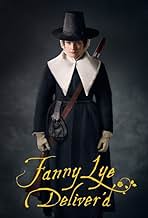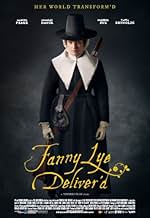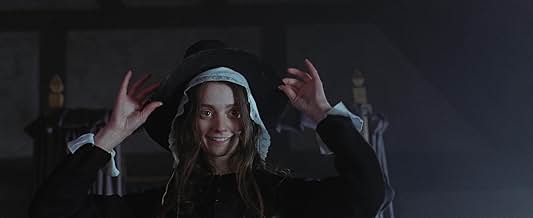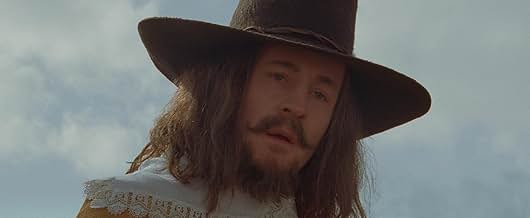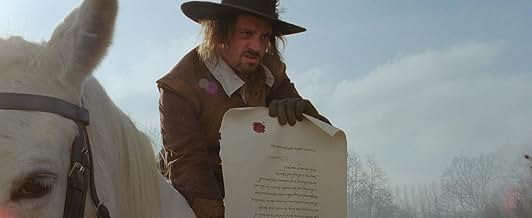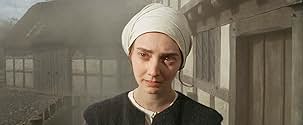IMDb-BEWERTUNG
6,2/10
1985
IHRE BEWERTUNG
Fanny Lye lernt, ihre beklemmende Ehe zu überwinden und eine neue Welt der Möglichkeiten zu entdecken - wenn auch unter großen persönlichen Kosten.Fanny Lye lernt, ihre beklemmende Ehe zu überwinden und eine neue Welt der Möglichkeiten zu entdecken - wenn auch unter großen persönlichen Kosten.Fanny Lye lernt, ihre beklemmende Ehe zu überwinden und eine neue Welt der Möglichkeiten zu entdecken - wenn auch unter großen persönlichen Kosten.
- Auszeichnungen
- 1 Gewinn & 7 Nominierungen insgesamt
Empfohlene Bewertungen
Horrible Histories meets Hammer Horror meets Blackadder....
The basic story could have been quite good but the film is so unrealistic as to be more of a pantomime than a drama. Low budget has not allowed for getting anything dirty so all the clothes, house etc are like brand new, nothing grubby as it would obviously have been and everyone looks like they are fresh out of the shower.
The acting is surprisingly ham and the baddies are more like a comedy duo despite being evil.
All in all, a missed opportunity as could have been good with the right budget and the chance to create a realistic dark representation.
The acting is surprisingly ham and the baddies are more like a comedy duo despite being evil.
All in all, a missed opportunity as could have been good with the right budget and the chance to create a realistic dark representation.
Very good film but sometimes it navigates away from the focus a bit too much unintentionally. Still loved it!
Most of us anyway hunger for original films and one of the many positives of Fanny Lye Deliver'd, is that it truly is a movie based on original ideas. Fancy a Puritan western? A folk horror tale? Or just an extremely unusual period piece? Thomas Clay's Fanny might just be more than worthy of your attention. But having said that, I also have to admit I have mixed feelings about it and am disappointed that such a beautifully acted film, which spent 3 years in post production (almost unbelievable for such a clearly low budget production) didn't end up being a better product.
There is a lot to admire here, The film looks amazing: the costumes and production design are striking and the subdued colours, often viewed through mist, make many shots look almost like paintings. The small cast is excellent, especially Charles Dance, who gives his stern character some humanity, and Maxine Peak, who, as the titular character, gradually discovers there are other ways to live and is tempted by the possibilities. The occasional anachronistic-sounding piece of dialogue aside, there's a strong period feeling.
The narrative itself is compellingly interesting, especially for those with a genuine interest in the time of the singular English republic. The pace varies for sure, but the storyline could never be accused of being predictable. And the major characters of the admittedly, deliberately small cast are all engaging in their own ways.
So, the letdowns? Clay's score, added in the above - stated post production phase of course, is varied in its themes and instrumentation but does seem to be lathered on way too much and overall ends up feeling rather awkward. At times it seems as though the music is simply playing in the background with little or no relation to what's happening on screen. And the inclusion of an arrangement of the Ode to Joy from Beethoven's Ninth Symphony more than 150 years before the composer wrote it was another jarring anachronism, too familiar to be fully effective.
On top of this, the film builds to a climactic action set piece, which is filmed in virtual darkness. For about a minute and a half, we can't really see what's going on, only hear a multitude of sounds. It might make for a good radio play, but it doesn't make for good cinema. The light of day reveals what has occurred, but the feeling that much dramatic heft, has been expunged from our viewing, cannot be easily passed off. Again, I have to ask, why was this allowed to occur in a film so long in post production and editing? Surely it could have been remedied in some way. It also would appear that this scene, which really defines the "Deliver'd" aspect of the film's title should have appeared somewhat earlier in the film in order that we can discover how well Fanny Lye has been delivered of her previous life.
In concluding, FLD will undoubtedly please many punters looking for movies with original riffs. However it only achieves qualified success, due to some wayward directorial decisions, from its albeit, very creative writer - director.
There is a lot to admire here, The film looks amazing: the costumes and production design are striking and the subdued colours, often viewed through mist, make many shots look almost like paintings. The small cast is excellent, especially Charles Dance, who gives his stern character some humanity, and Maxine Peak, who, as the titular character, gradually discovers there are other ways to live and is tempted by the possibilities. The occasional anachronistic-sounding piece of dialogue aside, there's a strong period feeling.
The narrative itself is compellingly interesting, especially for those with a genuine interest in the time of the singular English republic. The pace varies for sure, but the storyline could never be accused of being predictable. And the major characters of the admittedly, deliberately small cast are all engaging in their own ways.
So, the letdowns? Clay's score, added in the above - stated post production phase of course, is varied in its themes and instrumentation but does seem to be lathered on way too much and overall ends up feeling rather awkward. At times it seems as though the music is simply playing in the background with little or no relation to what's happening on screen. And the inclusion of an arrangement of the Ode to Joy from Beethoven's Ninth Symphony more than 150 years before the composer wrote it was another jarring anachronism, too familiar to be fully effective.
On top of this, the film builds to a climactic action set piece, which is filmed in virtual darkness. For about a minute and a half, we can't really see what's going on, only hear a multitude of sounds. It might make for a good radio play, but it doesn't make for good cinema. The light of day reveals what has occurred, but the feeling that much dramatic heft, has been expunged from our viewing, cannot be easily passed off. Again, I have to ask, why was this allowed to occur in a film so long in post production and editing? Surely it could have been remedied in some way. It also would appear that this scene, which really defines the "Deliver'd" aspect of the film's title should have appeared somewhat earlier in the film in order that we can discover how well Fanny Lye has been delivered of her previous life.
In concluding, FLD will undoubtedly please many punters looking for movies with original riffs. However it only achieves qualified success, due to some wayward directorial decisions, from its albeit, very creative writer - director.
The light that falls on John Lye's farm is diffuse, a gentle glow that passes through mist, It enters widows, softly illuminating Fanny Lye as she attends to household tasks. The imagery presented by director Thomas Clay and cinematographer Giorgos Arvanitis recalls paintings of Millet and Vermeer. While Millet's laborers sow the fields in ways suggesting contentment, and Vermeer's women appear touched by grace, the toils of Fanny (Maxine Peake) are attended by neither sentimentality nor joy.
Any sense of contentment is dispelled by an expository voice over and revelatory closeups. Fanny kneels on a hardwood floor as John lashes a switch across her back, her hands rigorously twist cloth in a wash basin. And the lovely woods and hills that surround her do not indicate an insular existence as much as an isolated one. There are no sign lines of the world beyond the stands of the trees and crests.
When youthful strangers, Thomas (Freddie Fox) and Rebecca (Tanya Reynolds) arrive, they assimilate into the family, bringing touches of levity to the Lye's young son Arthur and glimpses of liberation to Fanny. Both are interrupted by corporal punishment whenever John's notions of decorum are disturbed.
Rebecca lightens some of Fanny's burdens and Thomas emits whips of sensuality, these supported by the slow glide of Arvanitis's camera through the kitchen window to the exterior. As the fields of vision expand so, too, does the prospect of Fanny's freedom. Arvanitis also enables the audience to watch the characters like a stealthy observer, employing takes that gently pass around trees and structures to unimpeded views of the men felling trees and the women completing chores. The graceful movement of the still cam incrementally exposes challenges to John's constrictive Puritan values.
Ideologies eventually clash.
The competing perspectives, each supported by scriptural passages, struggle for dominance, the power shifting like the fortunes of the forces still fighting to control post civil war England. The battle illustrates a harsh truth: once any dogma takes control, ugly aspects of self righteousness and revenge are manifested.
In witnessing the struggle, Fanny is mostly silent as Peake's expressive face registers inner conflict, tightening at the possibility of pain for John or Arthur and relaxing at the prospect of freedom. As John, Charles Dance subtlety indicates his emotions in ways indicative of his mastery of screen acting-a slight tuck of the chin conveys disapproval, a quick blink, fear. Fox is best when his Thomas cajoles and charms, less so when he is charged with emotion. Reynolds adeptly projects both rustic ingenuousness and joyful licentiousness.
Beauty is present throughout the film. The first image of Rebecca is a closeup of her eyes, large and soft as those in a da Vinci portrait. And the pastoral beauty of the surroundings is consistently present. When violence intrudes, it plays out both suddenly and through gruesome struggle, unnerving audiences largely inured to depictions of injury and death. If Fanny's liberation is to come, barriers can be breached only by destruction and agony.
Any sense of contentment is dispelled by an expository voice over and revelatory closeups. Fanny kneels on a hardwood floor as John lashes a switch across her back, her hands rigorously twist cloth in a wash basin. And the lovely woods and hills that surround her do not indicate an insular existence as much as an isolated one. There are no sign lines of the world beyond the stands of the trees and crests.
When youthful strangers, Thomas (Freddie Fox) and Rebecca (Tanya Reynolds) arrive, they assimilate into the family, bringing touches of levity to the Lye's young son Arthur and glimpses of liberation to Fanny. Both are interrupted by corporal punishment whenever John's notions of decorum are disturbed.
Rebecca lightens some of Fanny's burdens and Thomas emits whips of sensuality, these supported by the slow glide of Arvanitis's camera through the kitchen window to the exterior. As the fields of vision expand so, too, does the prospect of Fanny's freedom. Arvanitis also enables the audience to watch the characters like a stealthy observer, employing takes that gently pass around trees and structures to unimpeded views of the men felling trees and the women completing chores. The graceful movement of the still cam incrementally exposes challenges to John's constrictive Puritan values.
Ideologies eventually clash.
The competing perspectives, each supported by scriptural passages, struggle for dominance, the power shifting like the fortunes of the forces still fighting to control post civil war England. The battle illustrates a harsh truth: once any dogma takes control, ugly aspects of self righteousness and revenge are manifested.
In witnessing the struggle, Fanny is mostly silent as Peake's expressive face registers inner conflict, tightening at the possibility of pain for John or Arthur and relaxing at the prospect of freedom. As John, Charles Dance subtlety indicates his emotions in ways indicative of his mastery of screen acting-a slight tuck of the chin conveys disapproval, a quick blink, fear. Fox is best when his Thomas cajoles and charms, less so when he is charged with emotion. Reynolds adeptly projects both rustic ingenuousness and joyful licentiousness.
Beauty is present throughout the film. The first image of Rebecca is a closeup of her eyes, large and soft as those in a da Vinci portrait. And the pastoral beauty of the surroundings is consistently present. When violence intrudes, it plays out both suddenly and through gruesome struggle, unnerving audiences largely inured to depictions of injury and death. If Fanny's liberation is to come, barriers can be breached only by destruction and agony.
... have a tough time establishing a base to grow as they are mistaken for heretics in 17th century England by Monty Python's Spanish Inquisition disguised as puritanical nutters - undeliver'd!
Wusstest du schon
- WissenswertesThe local accent in Shropshire and eastern Powys of the time was not recognisably "Welsh" or "West Midlands" in the way that might be expected today.
- PatzerAmong the linguistic anachronisms in the script are the following: Pee - to urinate: Although an old expression, the Oxford English Dictionary states that the term didn't come about until the eighteenth century, the century after this film is set. Shrooms - mushrooms with psychedelic properties: The first recorded use of this term in print was in Australia in 1977 Mixed emotions - a mid-twentieth century term describing ambivalence. Bleed out - to die due to blood loss: A twentieth century term with its origins in the United States (it is suggested that it was originally military jargon). Lose the attitude - An instruction meaning don't be rude: A late twentieth century term with its origins in the US.
- Alternative VersionenAlso exists in an Extended Cut, around 19 minutes longer than the Theatrical Cut, and currently only available through the film's 4K Ultra HD disc release in the UK. This version is the director's preferred version of the film.
- SoundtracksMarch to Joy
Written by Thomas Clay
Based on "Symphony No. 9" written by Ludwig van Beethoven
Heard as end theme
Top-Auswahl
Melde dich zum Bewerten an und greife auf die Watchlist für personalisierte Empfehlungen zu.
- How long is The Delivered?Powered by Alexa
Details
- Erscheinungsdatum
- Herkunftsländer
- Offizielle Standorte
- Sprache
- Auch bekannt als
- Fanny Lye Deliver'd
- Drehorte
- Produktionsfirmen
- Weitere beteiligte Unternehmen bei IMDbPro anzeigen
Box Office
- Weltweiter Bruttoertrag
- 40.753 $
- Laufzeit1 Stunde 52 Minuten
- Farbe
- Seitenverhältnis
- 2.39 : 1
Zu dieser Seite beitragen
Bearbeitung vorschlagen oder fehlenden Inhalt hinzufügen





